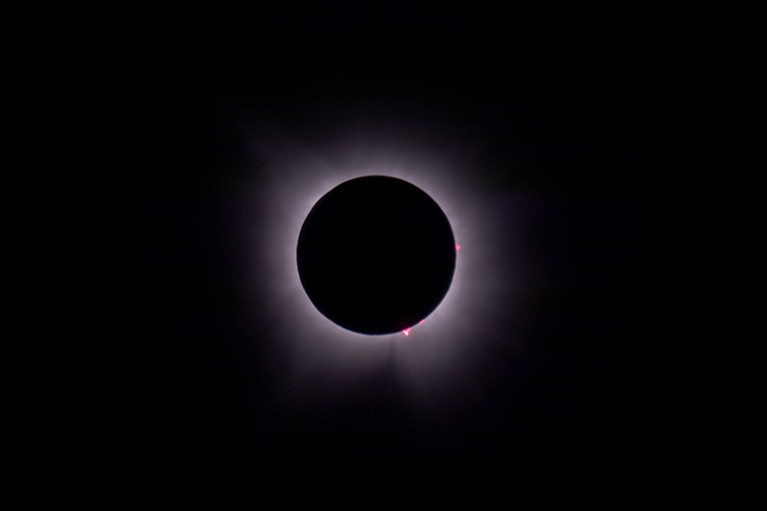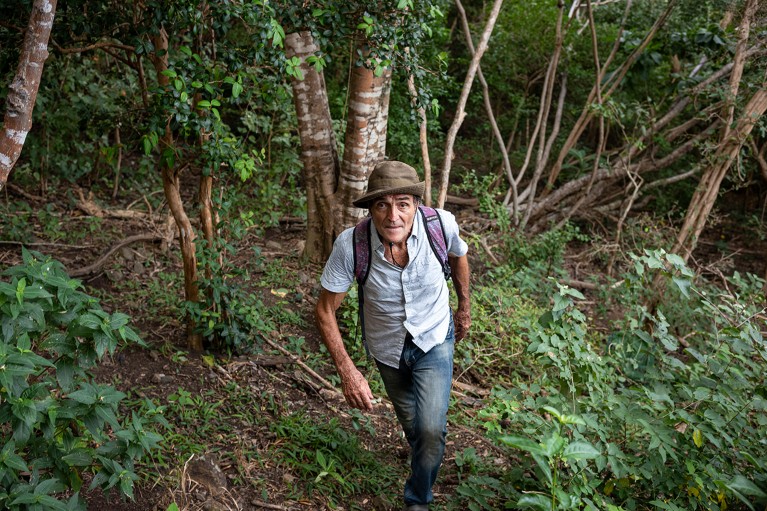[ad_1]
Whats up Nature readers, would you wish to get this Briefing in your inbox free day by day? Enroll right here.

Vibrant crimson spots referred to as prominences appeared alongside the photo voltaic disk through the complete eclipse.Credit score: Sumeet Kulkarni/Nature
Yesterday’s complete eclipse surprised skywatchers. “It makes your coronary heart need to skip a beat, and you can’t actually describe it to somebody who hasn’t skilled it in particular person,” retired educator Lynnice Carter instructed Nature. Some individuals may spot spectacular photo voltaic prominences as reddish dots across the edges of the moon’s shadow. Prominences are monumental loops of plasma, many occasions greater than Earth, that may final a number of months. They usually seem crimson as a result of they comprise hydrogen glowing at extraordinarily excessive temperatures.
Scientific American | 4 min learn

Thanks to everybody who’s shared their eclipse pictures with us! Connie Friedman’s view from a canoe on Lake Erie, Beth Peshkin’s portrait of Carly the canine placing security first and Les Jones’s picture of totality in Kingston, Canada, are amongst our favourites to date.
Fashionable Blackfoot individuals are carefully associated to the primary people that populated the Americas after the final ice age. DNA evaluation of six fashionable and 7 historic people reveals that they belong to a beforehand undescribed genetic lineage that extends again to greater than 18,000 years in the past. The info add to proof from Blackfoot oral traditions and archaeological findings, and will assist the claims that these individuals must ancestral lands.
Reference: Science Advances paper
Some scientists in Brazil say their labs gained’t find the money for to cowl primary bills resembling electrical energy and water until extra funding is discovered. Establishments within the Amazon argue that they’re the toughest hit as a result of their federal assist is already disproportionately low. President Luiz Inácio Lula da Silva’s administration is combating to reverse a number of the finances cuts imposed by the nation’s legislators.
Nature | 5 min learn
Options & opinion
The very completely different ways in which communities of desert ants and forest ants discover their meals demonstrates how our unpredictably messy world drives the evolution of social behaviours, argues biologist Deborah Gordon in The Ecology of Collective Conduct. The concept isn’t as contentious as Gordon makes out, writes reviewer and ecologist Seirian Sumner. Nevertheless it nonetheless highlights a vital level: “The interactions between organisms and their environments have grow to be more and more ignored as a result of fewer researchers are finding out animals of their pure environments.”
Nature | 6 min learn
“I attempted to compensate for my incapacity by working longer hours,” recollects biochemist Kamini Govender, who has a situation that severely impacts her peripheral imaginative and prescient. She developed coping methods, however ended up working at an unsustainable tempo. “Over time, I’ve learnt to practise higher self-care by realizing when to cease.” Extra must be accomplished to incorporate individuals with disabilities, Govender says. “Within the sciences, few of those individuals make it to the extent that I’ve, due to all of the hurdles they arrive throughout. It’s simpler to stop and quit.”
Nature | 6 min learn
A number of student-led teams and conferences are working to make sure that they’ve a component in figuring out AI’s position in training. College students acknowledge that the expertise could be a double-edged sword, however warning in opposition to knee-jerk blanket bans. “In speaking to lecturers, I seen that there’s a niche between what educators suppose college students do with ChatGPT and what college students truly do,” says laptop science pupil Johnny Chang.
Nature | 9 min learn
The place I work

Dario Sandrini is director of the KIDO Basis, Carriacou Island, Grenadines of Grenada.Credit score: Micah B Rubin for Nature
Dario Sandrini’s setting and training basis, KIDO, has run round 30 tasks on the small Caribbean island of Carriacou — from defending sea turtles to replanting mangroves. He’s now engaged on restoring areas which have been logged, in some instances, illegally. “With one other ten years of care, we’ll see the forest resurge,” he says. (Nature | 3 min learn)
Quote of the day
Don’t decide different individuals on the idea of the cognitive bias he co-discovered, says social psychologist David Dunning. Use the truth that individuals with restricted competence in an space overestimate their experience to replicate on your self, as an alternative. (Scientific American podcast | 33 min pay attention or 11 min learn)
Immediately, I’m having fun with biologist-comedian Adam Ruben’s musings on these bodily repetitive duties which might be a part of many scientists’ lives. “So many accomplishments in science are vaporous,” Ruben writes. Though guide lab work may be unbelievably boring, it can be extremely satisfying. “It meant I had achieved one thing tangible,” he says.
Please inform me about your favorite uninteresting (lab) duties, alongside every other suggestions on this article, by sending an e-mail to briefing@nature.com.
Thanks for studying,
Katrina Krämer, affiliate editor, Nature Briefing
With contributions by Flora Graham and Sarah Tomlin
Need extra? Signal as much as our different free Nature Briefing newsletters:
• Nature Briefing: Anthropocene — local weather change, biodiversity, sustainability and geoengineering
• Nature Briefing: AI & Robotics — 100% written by people, in fact
• Nature Briefing: Most cancers — a weekly e-newsletter written with most cancers researchers in thoughts
• Nature Briefing: Translational Analysis covers biotechnology, drug discovery and pharma
[ad_2]
Supply hyperlink

